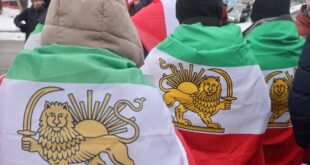The United States predicted a quick vote on a third resolution imposing sanctions on Iran over its nuclear program as it begins to build a case against Iran’s central bank for proliferation activities, senior State Department officials and European diplomats said. Diplomats from Germany and the permanent members of the U.N. Security Council — the United States, Britain, France, Russia and China — met Monday at the State Department to discuss the latest draft, as well as other steps that could be taken to get Iran to cooperate.
 “We continue to expect a vote soon on the draft sanctions resolution currently being discussed in New York,” State Department spokesman Tom Casey said. Casey said the group reaffirmed their commitment to the “dual track approach for responding to the challenge posed by Iran’s nuclear program.” The approach offers Iran a package of incentives for suspending its uranium enrichment program but calls for additional sanctions if Iran refuses to comply. The U.N. Security Council imposed two rounds of sanctions on Iran — in March 2007 and December 2006 — after Iran failed to comply with a U.N. deadline to suspend uranium enrichment and resume negotiations. Iran says its nuclear program is aimed solely at the peaceful production of nuclear energy. The members agreed earlier in February on a draft resolution and were hoping it would pass by unanimous vote, but some countries on the council, including Libya, South Africa and Indonesia, have voiced concerns about the text. Casey said the United States believes that the differences can be overcome for a unanimous vote in favor of the resolution. “Nobody seems to think these we can’t address their concerns and overcome the differences,” he said. Senior State Department officials and European diplomats said the “P5 plus one” — the permanent Security Council members and Germany — also discussed Friday possible other steps that could be taken if Iran doesn’t suspend its enrichment program, including intensifying a U.S.-led international campaign to convince banks to stop doing business with Iran. Those discussions have met with some success. These sources said the U.S. Treasury Department was collecting evidence that Iran’s central bank was involved in proliferation activities and helping other banks involved in proliferation activities elude existing sanctions. However, the sources said that it was unclear whether a strong enough case could be made. At some point the European Union, which is considering its own financial sanctions against Iran, could also look at Iran’s central bank. But for now, the sources said it was solely a U.S. initiative. The officials said the group also examined new ways to “sweeten the pot” on an offer it made in 2006 to convince Iran to come to the table, although they stressed no new decisions were taken. Casey said the group also discussed the latest report on Iran’s nuclear activities by the U.N. nuclear watchdog, the International Atomic Energy Agency. The report, released last week, said Iran had clarified many of the outstanding issues regarding its nuclear program but had not adequately cleared up alleged weaponization studies. The alleged weaponization includes the “green salt project” studies — research involving uranium tetrafluoride, a precursor to uranium hexafluoride, which is used in gas centrifuges to make enriched uranium — as well as high-explosive testing and missile design work, the agency said. Iran says its nuclear program is necessary to provide civilian energy for the country, but other countries have voiced concern that its true purpose is to produce nuclear weapons. The United States, which does not have diplomatic relations with Iran, has been the most vocal of those countries. Last year, Iran proclaimed it had been vindicated by a U.S. intelligence report that concluded the Islamic republic was not actively working toward developing a nuclear weapon. The National Intelligence Estimate, released on December 5, also surmised that Iran had been trying to acquire a nuclear weapon prior to 2003, which Iran categorically rejected.
CNN
 Eurasia Press & News
Eurasia Press & News



